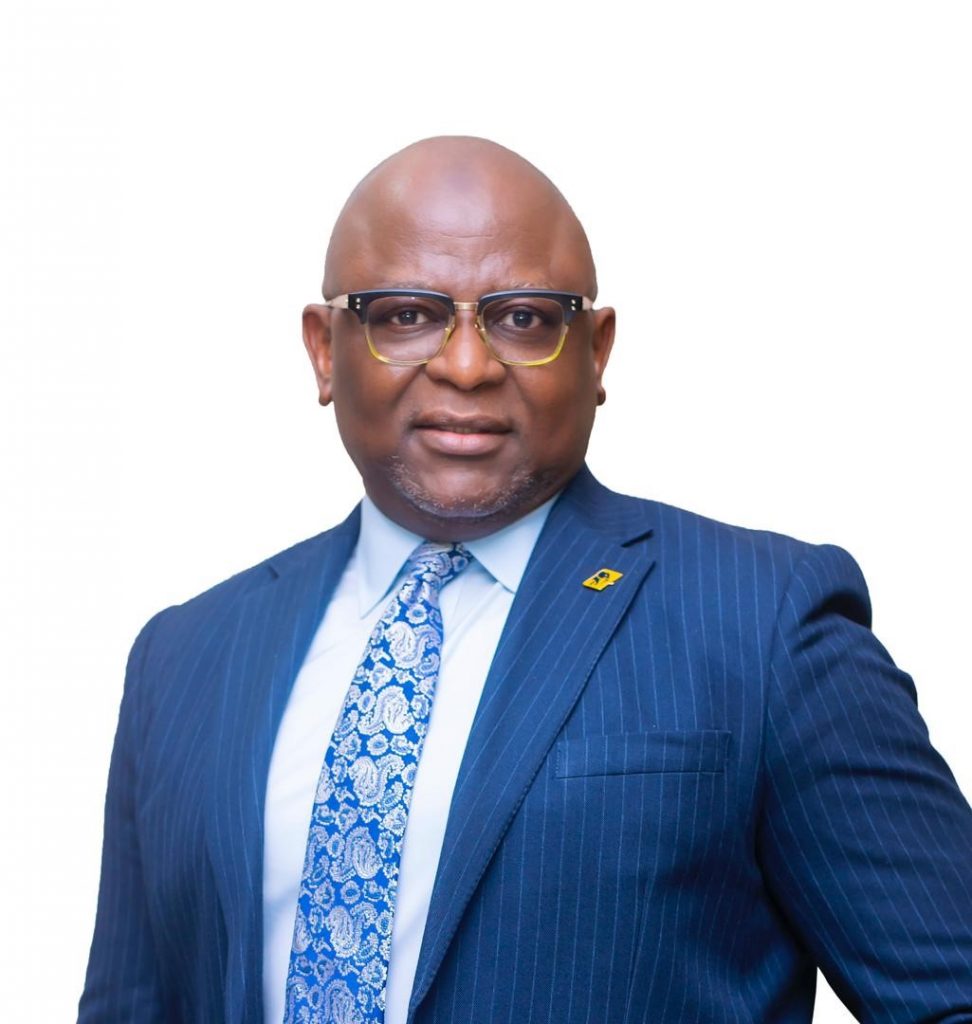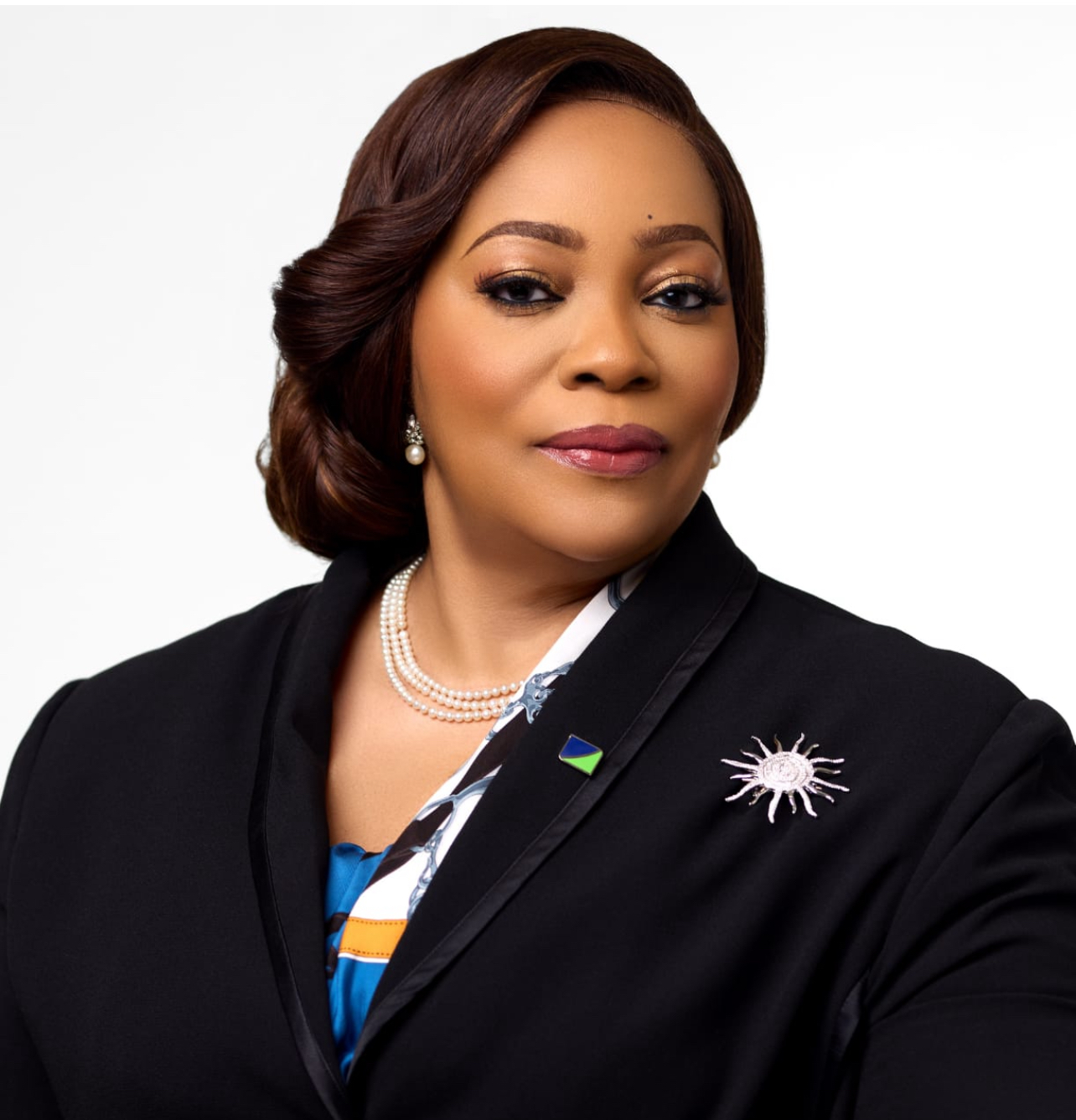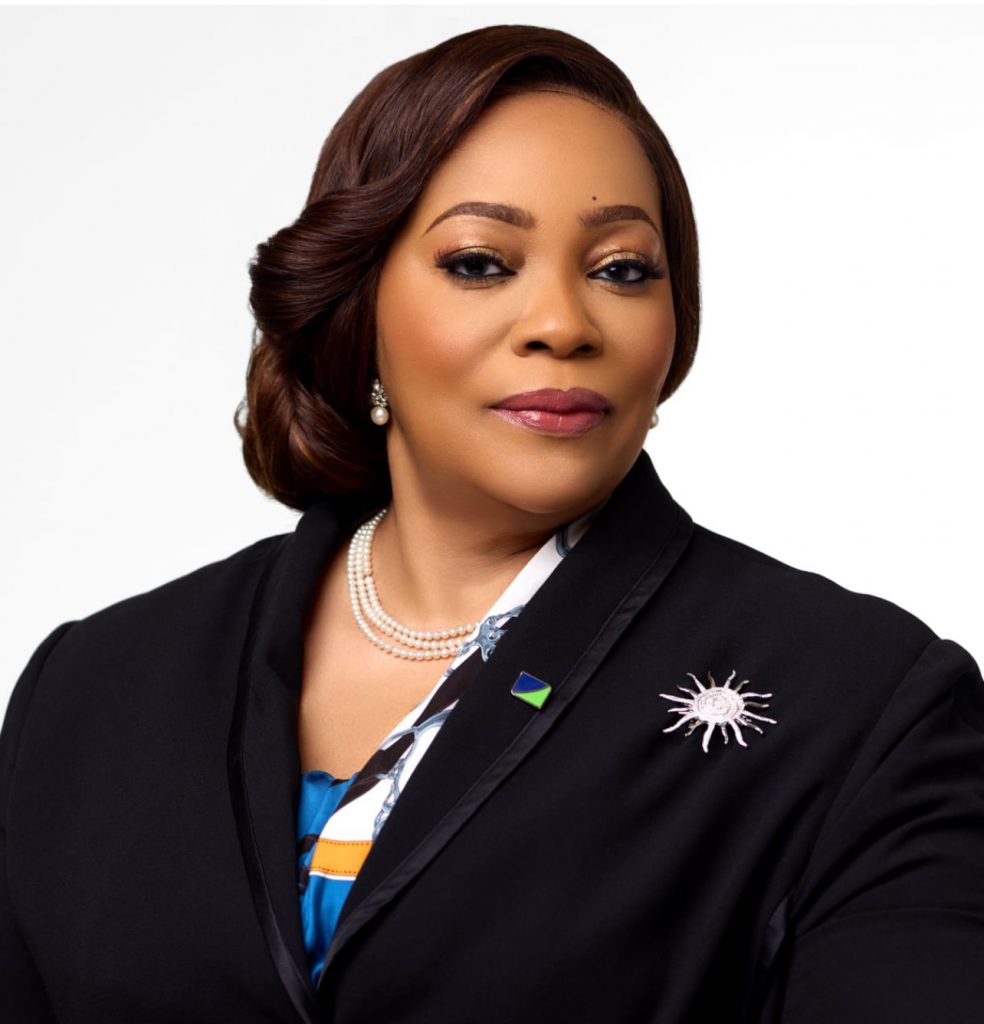brand
ADESOLA ADEDUNTAN, CEO, FIRSTBANK – HOW TO DO WELL BY DOING GOOD


I travel to meet Dr Adesola Adeduntan in Edinburgh, where he has been invited to give a keynote address at the Edinburgh School of Business about the role of financial institutions in driving financial inclusion.Fittingly, as you land in Edinburgh, you are greeted by billboards from different investment funds advertising their credentials in responsible and sustainable investment and how environmental, social and governance (ESG) considerations underpin their activities.
With economists and politicians questioning capitalism and the Western liberal model, today the emphasis is very much on a stakeholder-based approach, whereby growth and prosperity is more equally attributed and takes into consideration the needs of the wider community. Sustainable investment has become de rigueur among corporate jargon.
Dr Adesola Kazeem Adeduntan, CEO of First Bank of Nigeria, is a veteran in the Nigerian banking and corporate world. His overriding message, clearly expressed throughout his interview responses, and also at the various talks he gave during the day (at the Business School and at a law firm), is on the importance of doing good if you’re to do well – financially – in Nigeria and indeed, Africa.
A telling sign
FirstBank is actually the oldest bank in Africa. It was established in Lagos in 1894 as the Bank of British West Africa. Last year it celebrated its 125th anniversary. It is also the biggest bank in Nigeria in terms of assets and branch network.
For Adeduntan, a veterinary doctor by training, it becomes clear, once we have settled down for our discussion, that the institution’s longevity is a telling sign: it not only proves the bank’s resilience, it also shows that it has the right structures in terms of governance and the right business model, with the country’s development at its core. The theme of the anniversary celebrations was about how the bank has been woven into the fabric of Nigerian society.
The clear message to the industry is that while it is possible to make a quick buck, you can only enjoy the sort of longevity it has if you conduct your business with the interests of the country at heart.
Nonetheless, it’s apparent Adeduntan does not want to dwell too long on past glories. Using the analogy of a car, he says that there is a reason why the windshield is large whilst the rear-view mirror is small.
The challenge of fintech
As in most sectors, traditional ways of doing business have been coming under increasing disruption from ever-evolving technology. The banking industry is no exception and seems to be under siege from an expanding fintech onslaught.
I ask him if he is worried that non-financial companies will be entering the banking sector, especially given the recent change in regulation by the Central Bank that allows non-traditional finance institutions, namely mobile operators, to enter the fray.
He says he is not worried as his bank has one of the best defined strategies when it comes to financial inclusion and that it has the largest digital banking network in Nigeria.
Much of this has been developed through the bank’s FirstMonie Agents system: 46,000 agents represent the bank across the country. Currently, 9m customers transact on their USSD platform (by mobile phone, both smart and analogue) in addition to 3m customers transacting on the FirstMobile platform.
The agent network, the biggest of its kind in the country, enables the bank to provide services to the most remote rural communities; and because it doesn’t need to have an extensive branch network, it means that these services can be supplied at a fraction of the cost of a ‘legacy’ banking model.
Financial deepening
Adeduntan prefers to use the phrase ‘financial deepening’ when talking about the unbanked. Financial inclusion has increased from the low 20s to approximately 40% in Nigeria over the past seven years and is expected to double to the mid-80s within the next five years.
He says ‘financial deepening’ occurs when financial inclusion starts playing an important role in economic development. It’s about layering additional products on the current agency banking network – services such as micro-credit, micro-insurance and micro-pension.
The aim is to provide value-added services whilst at the same time increasing the savings rate; this aspect, which is critical in driving investment rates, has been one factor behind Asia’s rapid growth.
It is in this area, he says, that the bank has a vital role to play and a distinct advantage over new entrants. Technology, he emphasises, will play a crucial part in broadening financial inclusion. In addition, it is important to partner and collaborate with different stakeholders such as NGOs and other organisations dealing with the bottom of the pyramid, to help them reach out to different groups and also improve financial literacy.
Last year saw a boom in venture capital investment into Nigeria. For example, $400m was invested in a number of fintech start-ups during November alone. Is he not worried that these fintech players, with their lower cost base and ability to use technology, AI and big data to overcome traditional hurdles, are going to take the majority share of the pie when it comes to servicing the unbanked?
He says that will only be the case if the banks do not manage to reinvent themselves. In Edinburgh, he actually spent a large part of his day visiting tech hubs around the university in the city and speaking to fintech companies. FirstBank, he adds, has a number of partnerships with fintechs as well as its own Digital Laboratory developing new solutions for the bank.
Nevertheless, he firmly believes that the ‘legacy banks’ will still continue to play a very central role, especially “in this part of the world where banks are quite dominant and they have significant buying power”.
In terms of settlements and deposits, he sees many of these new players as partners they can work with, even if in some areas they will be competitors.
Scope for growth
Despite the impressive strides made by the banking sector in Nigeria, Adeduntan believes there is still a massive scope for growth for the sector. He points out that none of the country’s top banks have made the Top 10 Banks in Africa list, despite Nigeria being the continent’s largest economy.
He thinks that with the signing of the African Continental Free Trade Agreement, “we are entering a very interesting period for the banking sector, not only in Nigeria but Africa in general”.
On the domestic front, does he expect further consolidation? “Within certain thresholds,” he answers. “Anything that would allow the strengthening of the entire banking sector, I am sure the Governor of the Central Bank would be positive about.”
He also points to demographics and the high rate of the unbanked as great opportunities for the growth of the sector continentally. “According to UNICEF, two billion babies will be born in Africa in the next 30 years,” he says. “And in places like DRC [where FirstBank has a presence] financial penetration is as low as 5%.” Put the two sets of figures together and, in theory at least, you get vast opportunity. But he adds the all-important caveat that demographics are only good if managed properly.
Supporting national champions
It hasn’t all been plain sailing for the bank, however. Adeduntan inherited a bank with several large exposures in the oil & gas and energy sectors, at a time when the oil & gas prices fell considerably, resulting in the devaluation of the naira against the dollar.
He says his management weathered the storm, reduced NPL levels to under double digits, and has strengthened the risk infrastructure, thus enabling the bank to better deal with cyclical downturns in future.
Discussing the role of large companies in the commercial landscape, Adeduntan says it is essential to have big banks like FirstBank, just as it is vital to have national champion companies that have the scale and wherewithal to make transformative investment. Such companies require financial institutions of similar scale to support them. The Dangote Group’s investment into what will become the continent’s largest oil refinery is a case in point, he adds.
Role of the Central Bank
We move on to the regulator and the role of the Central Bank. Does he think that it is too interventionist, dictating how much banks should lend, where they should place their assets?
Adeduntan refused to be drawn into criticism of the regulator, with whom he says he, and other bank CEOs, have a strong relationship. But he did say that the role of a central bank in the development of an emerging economy is clearly different from the role of a central bank in a developed economy.
“It is not unusual that the Central Bank intervenes in critical sectors allied to the loan to deposit ratio. It’s about economic growth; it’s about development; it’s about channelling credit in sectors that are very important for the national economy.
“Let us take agriculture – again, we are one of the biggest lenders into that sector. We found the Central Bank intervention in some of those critical sectors extremely useful and not just for us as a bank, but for the country as a whole. When you look at intervention in agriculture, you have to put it in the context of the size of the population. Nigeria is a country of 200m people today. The business of feeding 200m people is a strategic business. Everything that is being done to ensure that at least we are self-sufficient in food production is strategically important. We find the Central Bank intervention in those areas quite useful and of national importance.”
He reflected the positive attitude of many Nigerian entrepreneurs to the country’s future. He says he has a lot of time for the Economic Advisory Council – composed of credible business leaders and economists – that has been put together by President Muhammadu Buhari. And despite reports that the government is not economy-minded, he thinks that it is a pro-business government.
Ethical banking
It is nearly 10.00 in the evening when we finish our talk, his day having started at 07.30am. We go back to sustainability and the role of financial services to make sure they are lending to institutions that are ethical about their business and operating in a sustainable manner.
He says that the journey has started even if it is still early days. “But ultimately,” he says, “this is where we are headed. The Nigerian Sustainable Banking Principle speaks to this particular question. I think it’s evident from the points that I’ve made today, you can say that FirstBank is a bank that is happy to forego a few basis points in terms of its net margins, if that means it is contributing to development in a more ethical and sustainable way.
“We’ve always made a point that profitability is very important for us at FirstBank, but economic growth and national development is equally very important and speaks to the sustainability question.”
brand
GTBank Launches Quick Airtime Loan at 2.95%


Guaranty Trust Bank Ltd (GTBank), the flagship banking franchise of GTCO Plc, Africa’s leading financial services group, today announced the launch of Quick Airtime Loan, an innovative digital solution that gives customers instant access to airtime when they run out of call credit and have limited funds in their bank accounts, ensuring customers can stay connected when it matters most.
In today’s always-on world, running out of airtime is more than a minor inconvenience. It can mean missed opportunities, disrupted plans, and lost connections, often at the very moment when funds are tight, and options are limited. Quick Airtime Loan was created to solve this problem, offering customers instant access to airtime on credit, directly from their bank. With Quick Airtime Loan, eligible GTBank customers can access from ₦100 and up to ₦10,000 by dialing 73790#. Available across all major mobile networks in Nigeria, the service will soon expand to include data loans, further strengthening its proposition as a reliable on-demand platform.
For years, the airtime credit market has been dominated by Telcos, where charges for this service are at 15%. GTBank is now changing the narrative by offering a customer-centric, bank-led digital alternative priced at 2.95%. Built on transparency, convenience and affordability, Quick Airtime Loan has the potential to broaden access to airtime, deliver meaningful cost savings for millions of Nigerians, and redefine how financial services show up in everyday life, not just in banking moments.
Commenting on the product launch, Miriam Olusanya, Managing Director of Guaranty Trust Bank Ltd, said: “Quick Airtime Loan reflects GTBank’s continued focus on delivering digital solutions that are relevant, accessible, and built around real customer needs. The solution underscores the power of a connected financial ecosystem, combining GTBank’s digital reach and lending expertise with the capabilities of HabariPay to deliver a smooth, end-to-end experience. By leveraging unique strengths across the Group, we are able to accelerate innovation, strengthen execution, and deliver a more integrated customer experience across all our service channels.”
Importantly, Quick Airtime Loan highlights GTCO’s evolution as a fully diversified financial services group. Leveraging HabariPay’s Squad, the solution reinforces the Group’s ecosystem proposition by bringing together banking, payment technology, and digital channels to deliver intuitive, one-stop experiences for customers.
With this new product launch, Guaranty Trust Bank is extending its legacy of pioneering digital-first solutions that have redefined customer access to financial services across the industry, building on the proven strength of its widely adopted QuickCredit offering and the convenience of the Bank’s iconic *737# USSD Banking platform.
brand
GTCO Proudly Headlines the NPA Lagos International Polo Tournament as Main Sponsor— Championing Great Experiences and Heritage


Guaranty Trust Holding Company Plc (GTCO Plc) (NGX: GTCO; LSE: GTCO), one of Africa’s leading financial services groups, is proud to announce its continued support as the main sponsor of the NPA Lagos International Polo Tournament, one of Africa’s oldest and most prestigious sporting events. The 2026 edition will be held at the Lagos Polo Club, Ikoyi, from Tuesday, January 27 to Sunday, February 15, bringing together top local and international polo teams and spectators from across the continent and beyond.
The 2026 NPA Lagos International Polo Tournament will feature top‑tier teams competing for major prizes, including the Majekodunmi Cup, Independence Cup, Open Cup, Silver Cup and Low Cup, among others. Guests can expect a fusion of thrilling equestrian action, polo-inspired lifestyle showcase, and curated hospitality experiences. The event will also be livestreamed, allowing audiences online to share in the excitement and spectacle.
Commenting on GTCO’s role as main sponsor of the Lagos International Polo Tournament, Segun Agbaje, Group Chief Executive Officer, said: “This tournament, one of the oldest in Africa, celebrates not only the noble sport of polo but the values we hold dear as a brand: teamwork, discipline, fair play, and a commitment to excellence. Beyond the field, it showcases Nigeria and Africa to a global audience, reinforcing the continent’s place on the world stage. Our longstanding sponsorship of the NPA Lagos International Polo Tournament reflects our conviction that sport can amplify opportunity, foster connections, and deliver world-class experiences for all.”
The NPA Lagos International Polo Tournament has long been celebrated not only for its thrilling competition and equestrian excellence but also for its rich heritage and cultural resonance within Africa’s sporting tradition. GTCO’s sponsorship embodies the Group’s commitment to creating platforms that unite communities and drive social impact across diverse audiences.
brand
Fidelity Bank appoints Onwughalu as Chairman following completion of Chike-Obi’s tenure

 Tier one lender, Fidelity Bank Plc, has announced the completion of the tenure of Mr. Mustafa Chike-Obi as Chairman of its Board of Directors effective December 31, 2025, and the appointment of Mrs. Amaka Onwughalu as the new Chairman of the Board, effective January 1, 2026.
Tier one lender, Fidelity Bank Plc, has announced the completion of the tenure of Mr. Mustafa Chike-Obi as Chairman of its Board of Directors effective December 31, 2025, and the appointment of Mrs. Amaka Onwughalu as the new Chairman of the Board, effective January 1, 2026.
The board transitions are in alignment with the Bank’s policy and have been communicated to the Central Bank of Nigeria, the Nigerian Exchange Group, and other stakeholders.
Under Mr. Chike-Obi’s leadership, Fidelity Bank repaid its Eurobond, completed the first tranche of its public offer and rights issue that were oversubscribed by 237 percent and 137.73 percent respectively, expanded internationally to the United Kingdom, and received improved ratings from various agencies amongst a long list of achievements. His tenure also saw the Bank strengthen its capital position, record steady growth in customer deposits and total assets, deepen its digital banking capabilities, and enhance its corporate and investment banking proposition. The bank equally made notable progress in governance, risk management, and operational efficiency, all of which contributed to strengthened market confidence and the Bank’s sustained upward performance trajectory.
Reflecting on his tenure, Mr. Mustafa Chike-Obi said, “It has been a privilege to serve as Chairman of Fidelity Bank. The dedication of our Board, management, and staff has enabled us to reach significant milestones. I am confident that the Bank will continue to thrive and deliver value to all stakeholders.”
Mrs. Amaka Onwughalu’s appointment marks a new chapter for Fidelity Bank. She joined the Board in December 2020 and has chaired key committees. With over 30 years of banking experience, including executive roles at Mainstreet Bank Limited and Skye Bank Plc. She holds degrees in Economics, Corporate Governance, and Business Administration, and has attended executive programmes at global institutions. Mrs. Onwughalu is a Fellow of several professional bodies and has received awards for accountability and financial management
“I am honoured to lead the Board of Fidelity Bank at this exciting time. Our recent achievements have set a strong foundation for continued growth. I look forward to working with my colleagues to drive our strategy and deliver sustainable value,” commented Mrs. Onwughalu.
Ranked among the best banks in Nigeria, Fidelity Bank Plc is a full-fledged Commercial Deposit Money Bank serving over 9.1 million customers through digital banking channels, its 255 business offices in Nigeria and United Kingdom subsidiary, FidBank UK Limited.
The Bank is a recipient of multiple local and international Awards, including the 2024 Excellence in Digital Transformation & MSME Banking Award by BusinessDay Banks and Financial Institutions (BAFI) Awards; the 2024 Most Innovative Mobile Banking Application award for its Fidelity Mobile App by Global Business Outlook, and the 2024 Most Innovative Investment Banking Service Provider award by Global Brands Magazine. Additionally, the Bank was recognized as the Best Bank for SMEs in Nigeria by the Euromoney Awards for Excellence and as the Export Financing Bank of the Year by the BusinessDay Banks and Financial Institutions (BAFI) Awards.
-

 news5 years ago
news5 years agoUPDATE: #ENDSARS: CCTV footage of Lekki shootings intact – Says Sanwo – Olu
-

 lifestyle6 years ago
lifestyle6 years agoFormer Miss World: Mixed reactions trail Agbani Darego’s looks
-

 health5 years ago
health5 years agoChairman Agege LG, Ganiyu Egunjobi Receives Covid-19 Vaccines
-

 lifestyle4 years ago
lifestyle4 years agoObateru: Celebrating a Quintessential PR Man at 60
-

 health6 years ago
health6 years agoUPDATE : Nigeria Records 790 new cases of COVID-19
-

 health6 years ago
health6 years agoBREAKING: Nigeria confirms 663 new cases of COVID-19
-

 entertainment1 year ago
entertainment1 year agoAshny Set for Valentine Special and new Album ‘ Femme Fatale’
-

 news9 months ago
news9 months agoBREAKING: Tinubu swears in new NNPCL Board


